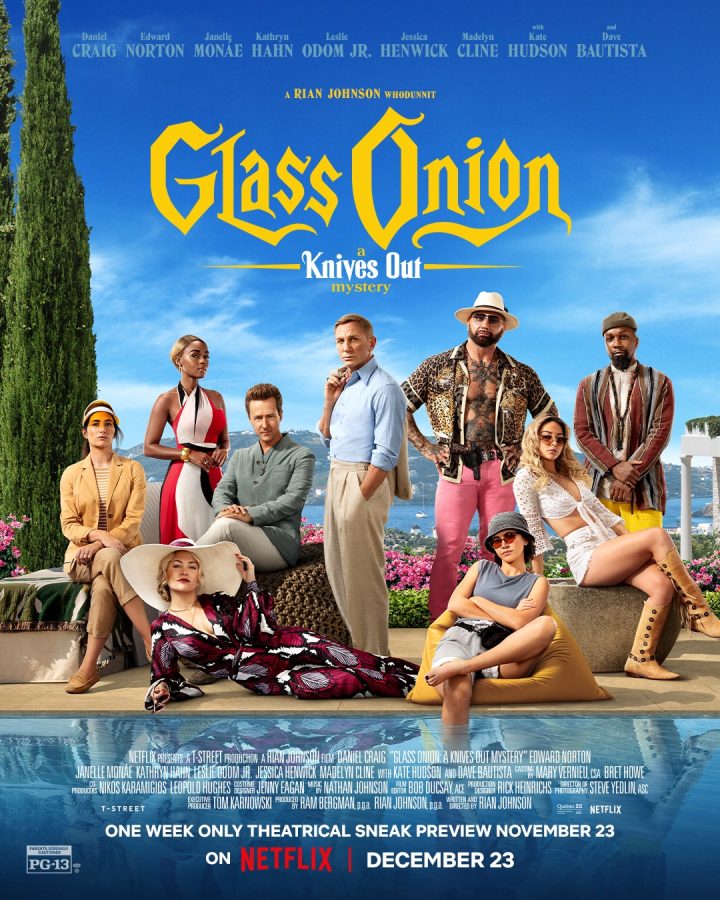“Glass Onion: A Knives Out Mystery,” directed by Rian Johnson, is available on Netflix, but it had a theatrical release around Thanksgiving. Although the film is a sequel to “Knives Out,” the celebrity detective Benoit Blanc (Daniel Craig) is the only character who returns from the prior film, with one small possible exception. In many ways, “Glass Onion” is too similar to the first film. I liked “Knives Out,” but the sequel only exacerbates the first film’s problems. This is a spoiler-free review.
The plot starts when tech mogul Miles Bron (Edward Norton) sends his old friends giant puzzle boxes to solve. When solved, an invitation comes out. The invitation promises a getaway to a private island in Greece where a murder mystery party will take place. Benoit Blanc also mysteriously gets his hands on an invitation.
Except for one character, none of the new characters have much depth. The way the characters are crafted is too similar in the films. For a mystery whodunnit, this is not good. I have seen criticism that the characters in the first film were lacking depth, however, I do not agree. The characters in “Knives Out” have interesting interactions and are put in revealing situations. In ”Glass Onion,” many of the characters fit neatly into stereotypes. There is the annoying tech billionaire, a buff twitch streamer (Dave Bautista) who complains about feminists, a betrayed cofounder of a tech company (Janelle Monáe), a former celebrity (Kate Hudson) who gets canceled for bigoted tweets and others.
Benoit Blanc was not the most interesting character in the first film, and not much is added to his character in this one. He rarely feels desperate or out of his element. He also does not seem to have any emotional conflict with any of the characters. Blanc has some interesting scenes late in the film, but it does not feel like enough.
“Knives Out” gave the audience all the information Blanc knew and sometimes more, with one small exception. It put the viewer alongside Blanc, the detectives and another character in trying to solve the mystery. For reasons that may go too much into spoilers, the film has a fundamentally different viewing experience than its predecessor, and audiences may feel cheated by this aspect of the film. I also do not think the film is that engaging emotionally.
“Knives Out” touched on larger social issues like xenophobia and the idea of the “self-made” millionaire. In “Glass Onion,” there are some interesting ideas late in the film about truth versus power. There is also some criticism of the influence of wealth in society, although at times it feels very much like thinly veiled jokes about specific celebrities, almost like a political cartoon.
The film does have a good number of laughs. The island resort is a great, fun set. The over-the-top gadgets and technology are used for comedic effect. While some of the jokes made me laugh, too much of the humor comes off as insular and focused on celebrities. One could argue that the film is mocking how rich people are insular and celebrity obsessed. That said, Rian Johnson has met more celebrities than I have, so he would probably know more about how they act. In addition, the film has a bunch of celebrity cameos. Some of the people are playing actual characters in the film and giving performances, but most are just playing themselves. It feels tone deaf to have a bunch of well-known celebrities popping up in a film about how celebrities are shallow.
In a similar way, the film’s depiction of COVID-19 seems surface level. The film is intentionally set during the pandemic in an effort to be topical, but it says nothing interesting about it. It presents a very surface level depiction of people dealing with the pandemic that does not address the widespread harm caused by it. The film also completely drops the subject within the first act. This begs the question: Why have it in the first place? Compare this to something like “Parasite’s” depiction of the how the massive rainfall affects the rich and poor of the city. Despite being released before COVID was widely recognized in the United States, that film has more interesting things to say related to the pandemic than “Glass Onion” does.
I may seem too negative towards the film in an effort to avoid spoilers, but it has some great aspects. Some of the jokes are fantastic. I felt intrigued for most of the film and wanted to find out what was going on. There is an intricate plot, and small, early details early are later revealed to be important. Despite this, the film fails as a whodunnit mystery and feels far too similar to ”Knives Out.”
Scott Lerer can be reached at [email protected].



















